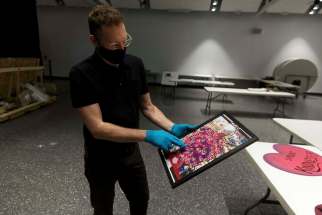Depression, anxiety widespread in city police force, 2013 survey found
Read this article for free:
or
Already have an account? Log in here »
To continue reading, please subscribe:
Monthly Digital Subscription
$1 per week for 24 weeks*
- Enjoy unlimited reading on winnipegfreepress.com
- Read the E-Edition, our digital replica newspaper
- Access News Break, our award-winning app
- Play interactive puzzles
*Billed as $4 plus GST every four weeks. Offer only available to new and qualified returning subscribers. Cancel any time.
Read unlimited articles for free today:
or
Already have an account? Log in here »
Hey there, time traveller!
This article was published 09/03/2021 (1424 days ago), so information in it may no longer be current.
High levels of stress. Depression and anxiety. Alcohol abuse.
A 2013 survey of Winnipeg police officers revealed troubling findings about the force’s health and wellness.
The results were recently obtained by the Free Press in the wake of a growing rift between the Winnipeg Police Service’s rank-and-file officers and police Chief Danny Smyth — exacerbated by a constable’s suicide in February.
Amid concerns over morale and rising anti-police sentiments, the Winnipeg Police Association is commissioning an updated review to address officers’ health, which Smyth has approved, according to an internal memo from the chief.
Criminologist Curtis Griffiths of the University of British Columbia, who helped conduct the 2013 survey, has been retained to oversee the updated review.
The previous survey examined the effects of police work on officers, asking respondents about stress, burnout, drug and alcohol use, job satisfaction, post-traumatic stress disorder, quality of life and anxiety. It was conducted as part of a wider operational review of the service.
Frank Cormier, the head of the University of Manitoba’s sociology and criminology department, said first responders including police have long suffered high rates of depression, anxiety, problem drinking and suicide.
“One of the big problems still is… any admission of mental health struggle within a police organization is heavily stigmatized. There’s just no question about it,” he said.
“Organizations are putting in place all the right things, but if individuals won’t take advantage of that and they’re not supported by their colleagues… it’s probably not going to go over.”
About 420 officers responded to the 2013 health survey, but some didn’t answer every question.
It found 24 per cent of responding officers displayed symptoms of harmful or hazardous drinking, based on a test developed by the World Health Organization.
Meanwhile, 75 per cent said they had moderate levels of anxiety, while 24 per cent had “severe” or “extremely severe” anxiety.
Rates of depression weren’t much different — 74 per cent of respondents said they had suffered moderately, while 30 per cent reported severe or extremely severe depression.
Forty-one per cent of officers reported high exhaustion, while 62 per cent said they had a high rate of cynicism.
Neither the police service nor Winnipeg Police Association responded to questions from the Free Press Tuesday.
Markus Chambers, chairman of the Winnipeg Police Board, said he’s supportive of the police service and union working to get “objective data” on the health and morale of officers.
The board is concerned a diminished morale could impact services and officers, he said, pointing to the pandemic and rising anti-police sentiment as potential factors in diminishing confidence.
New wellness survey ordered
Winnipeg police Chief Danny Smyth has agreed with the union’s demand to conduct an updated survey about police officers’ health and wellness.
The chief wrote about his decision in an internal memo obtained by the Free Press.
Police leadership and the Winnipeg Police Association “share a common interest in supporting the health and wellness of the people who work for the (Winnipeg Police Service), and by extension their morale,” Smyth wrote Tuesday.
The union pushed for a survey last week as tensions reached a breaking point between the chief and rank-and-file members.
“The last time an exercise like this was conducted was years ago in a very different environment,” Smyth said.
Winnipeg police Chief Danny Smyth has agreed with the union’s demand to conduct an updated survey about police officers’ health and wellness.
The chief wrote about his decision in an internal memo obtained by the Free Press.
Police leadership and the Winnipeg Police Association “share a common interest in supporting the health and wellness of the people who work for the (Winnipeg Police Service), and by extension their morale,” Smyth wrote Tuesday.
The union pushed for a survey last week as tensions reached a breaking point between the chief and rank-and-file members.
“The last time an exercise like this was conducted was years ago in a very different environment,” Smyth said.
He said the pandemic and anger toward police over in-custody deaths and violent arrests have affected morale.
“None of us have lived through a pandemic. The isolation and restrictions have been stressful for all of us and have prevented us from gathering to support one another in the way we are accustomed to.”
The chief also wrote about a “groundswell of animosity unleashed in the wake of the murder of George Floyd,” which he said has harmed officers.
“I see the impact of that constant criticism and antagonism. I see the real and lasting harm that this has done to the men and women of the WPS who continue to serve the community,” Smyth said.
“I have been impressed with how well you have performed in such difficult times. I will do my best to ensure you have the training and equipment to do your job, to ensure you have health and wellness supports, and that we find a way to share our story with the community,” the chief’s memo states.
Floyd, an unarmed Black man, died during his arrest by Minneapolis police officers on May 25, 2020. On Tuesday, the first jurors were picked in the trial of former police officer Derek Chauvin, 44, who is accused of second-degree unintentional murder and manslaughter.
Smyth’s memo also addressed criticism of his leadership and for his response to the suicide of a constable last month, which sent shock waves through the ranks.
“I accept that criticism and will continue to learn from this.”
The union said the chief waited too long to visit with the officer’s family and didn’t show adequate support for officers who were hurt by the tragedy.
“There are some people who focus on abolishing police, and simply do not recognize the services… are provided by humans who are also subject to emotion and feeling. We can agree to disagree about funding or defunding, but should not de-value the work that officers do as they literally put their lives on the line,” Chambers said.
Cormier said the waves of organized protests against police are unprecedented in his career as a social scientist.
“Police are looking at an entirely different environment right now… Naturally, I think, police are concerned about these things, that they are being scrutinized, in many cases being criticized,” the criminologist said.
“In some cases they might be looking at fundamental change in the way policing is carried out. If that happened in any sector, the people in that sector would be quite concerned about it.”
But that puts the police chief in a precarious position, Cormier said.
“He has to respond to the concerns that are being expressed, and many of them are very legitimate concerns. There is a lot of evidence that fundamental changes are needed in how we do policing,” he said.
erik.pindera@freepress.mb.ca
Twitter: @erik_pindera
Winnipeg Police health and wellness survey findings

Erik Pindera
Reporter
Erik Pindera reports for the city desk, with a particular focus on crime and justice.
Our newsroom depends on a growing audience of readers to power our journalism. If you are not a paid reader, please consider becoming a subscriber.
Our newsroom depends on its audience of readers to power our journalism. Thank you for your support.
History
Updated on Wednesday, March 10, 2021 9:53 AM CST: Styles fact box









